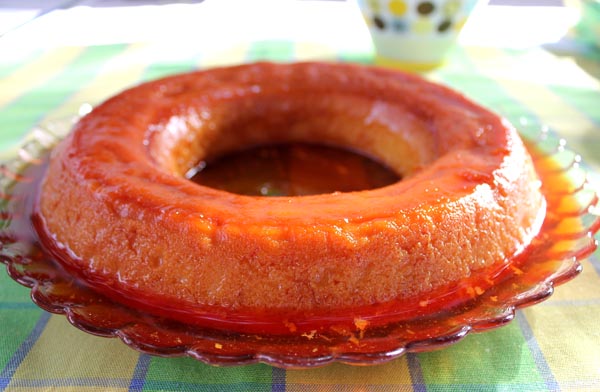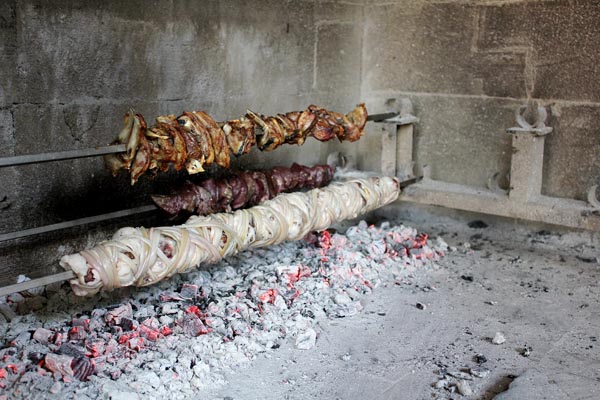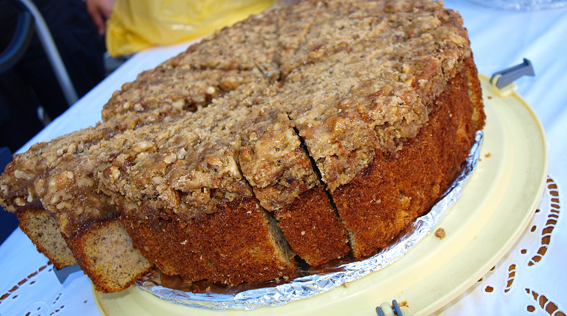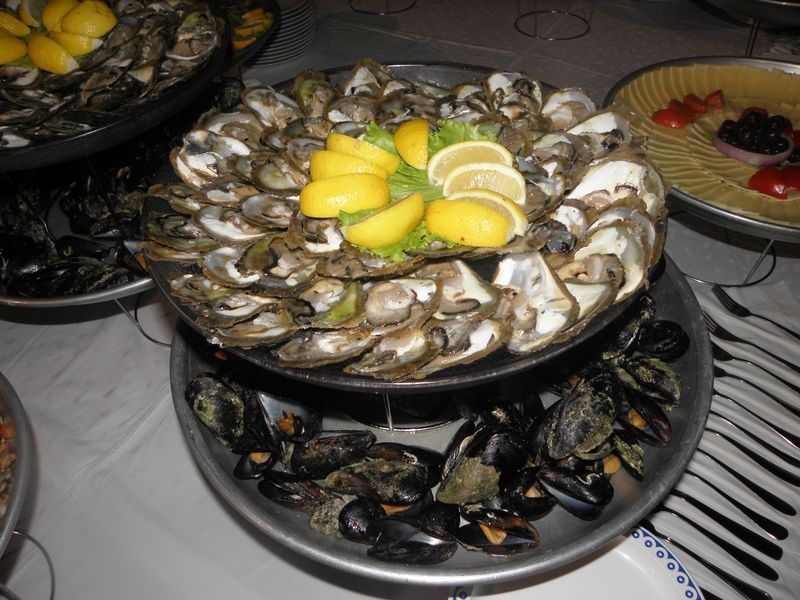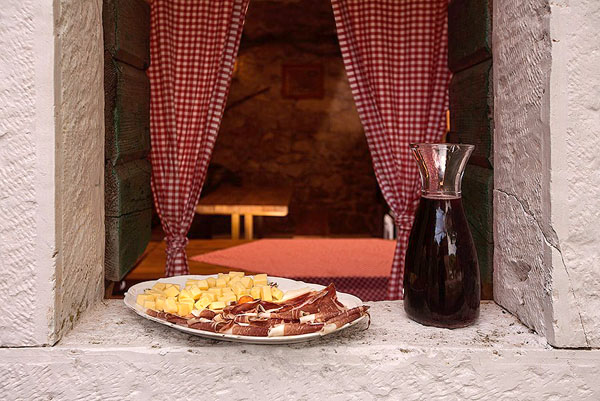[:HR]Autohtona jela za bogove
U posljednje vrijeme meniji koji se nude po dalmatinskim restoranima su svi sa prefiksom – izvorno i prirodno, nudi se specijalitet do specijaliteta.
Foto: TZ Supetar
Premda je dalmatinska zemlja škrta, vrijedne su ruke težaka, godinama krčile kamenjar i od njega stvarale plodne vrtače. Koliko je podneblje bilo škrto, toliko je mašta pri kombiniranju, slaganju okusa, maksimalnom iskorištavanju svake namirnice – stvarala čuda.
Tako su i Zagora i dalmatinski otoci imali svoje mozaike od spize. U svakom dijelu Dalmacije, bilo je ponešto karakteristično upravo za to područje. No nadasve – ukusno! Mnogi kažu, hrana za bogove.
Tako se na otocima, gdje je zemlje bilo malo, sve iskorištavalo. I divlje zelje, grmovi bilja koje je bilo jestivo, slagalo se u zelenu porciju povrća, oplemenjivalo maslinovim uljem i domaćim bijelim lukom.
Tu se porciju “pojačavalo” ribom, svježom ispečenom na gradele ili lešo skuhanom, dok se često, pogotovo zimi, pribjegavalo i sušenju morskih delicija. I za slatkim se sezalo u prirodu, pa su se u šećer valjali bademi, odnosno menduli, korice naranče ili limuna, popularni arancini, pa sušene smokve od kojih su se slagale najljepše torte, oplemenjene orasima, makom, rogačem…
Velik dio te tradicije danas nude dalmatinski kuhari. Gastronomska ponuda se vratila na staro – sve ono zdravo i domaće postalo je izuzetno popularno, bolje reći cijenjeno, jer napokon zdravo postaje – primarno!
Otoci su se dičili i bogatstvom gljiva, pa se tijekom sezona te jestive biljke spremalo na mali milijun načina, a nisu im bile nepoznate ni alge. Morske trave su bili pravi izvori joda, pa se današnji restorani s takvom ponudom nude pod oznakom – ekskluzivni! Još kada vam kao predjelo ponude ikru morskog ježa, ili pak na pladnju s ledom poslože kamenice ili morsko jaje – neprocjenjivo.
Što se tiče same Zagore, još teže je bilo doći do plodne zemlje. Malo se tamo dalmatinskih polja diči oranicama. Godinama, bolje reći stoljećima seljaci su vadili kamenje, slagali ga u zidove, a ono malo zemlje obrađivali. Zrna pšenice i kukuruza posebno su se mljela u starim vodenim mlinovima, a pura iliti palenta, kuhala se na poseban način. Sat vremena se miješala drvenom kuhačom, i na kraju oplemenjivala životinjskom masnoćom (svinja), dok bi prava delicija za blagdane bili komadi pure kojoj je dodano začinsko bilje, i na kraju poprženo na otvorenoj vatri. Upravo ovaj recept je danas traženi dodatak za ribu na stolu većine restorana koji njeguju dalmatinsku kužinu. Zagora je bila i pravo mjesto za pronalazak puževa, pa su ovi ukusni zalogajčići, s dodatkom domaće kapule, zaliveni domaćim vinom, bili vrhunsko jelo. Sarme, domaće mljeveno miješano meso uvijeno u kiseli kupus, uvijek su prisutne. Bilo se radi o sinjskim arambašićima ili običnoj sarmi, dodatak je uvijek pire od domaćih krumpira.
Možemo tako nizati bezbroj autohtonih proizvoda kojima se Dalmacija diči, od Drniša i njegovih pršuta kojima je kvaliteta svjetski poznata, do otočkih ribljih specijaliteta kao što je sušena hobotnica, pršut od morskog psa, osušeni ugor ili gruj, i mnogo toga za Dalmaciju jedinstvenog. Za sam kraj sve serviramo uz domaće vino, a barem je ta paleta u Dalmaciji (pre)bogata svim i vrstama grožđa i okusima sorte. Za aperitiv će vas čekati domaća rakija, od rogačuše, lozovače, medice…okus koji samo poželjeti možete.
Mi njegujemo autohtono i tradicionalno, koje uvijek garantira i – zdravo!
Naslovna fotografija: TZ Supetar
Autochthonous food of the gods
Recently, the menus offered by Dalmatian restaurants are all prefixed with – the original and natural, offering a specialty to specialty. Although the Dalmatian soil is poor, diligent farmer’s hands have cleared the rocky areas for years and created fertile valleys from it. As much as the resorts were poor, so much was the imagination creating miracles in combining and sorting of flavors, in making the most of any food.
Thus, Zagora and the Dalmatian islands had their own mosaics of food. In every part of Dalmatia was something typical of the area. But most of all – delicious! Many say, the food of the gods.
On islands, where fertile lands were only few, it was all exploited: wild greens, shrubs of edible plants constituted a green portion of vegetables, enriched with olive oil and domestic garlic. The portion was “intensified” with freshly grilled or boiled fish, and often, especially in winter, people resorted to drying seafood delicacies. The sweets were also of natural origin, so almonds, lemon and orange zest – the popular arancini, were coated in sugar; and figs were dried and used for making the most beautiful cakes, enriched with walnuts, poppy seeds, carob…
A large part of that tradition is nowadays offered by Dalmatian chefs. The gastronomic offer is back to the old school – all that is healthy and homemade has become extremely popular, rather appreciated – because healthy finally becomes primary! Islands are proud of the richness of mushrooms, and during the season these edible plants were prepared in a million ways, but they were not unfamiliar even with the algae. Sea grasses were the true sources of iodine, so today’s restaurants offer such meals under the label – exclusive! And when you are offered with a sea urchin roe, or with sea eggs and oysters on a tray with ice – priceless!
As for the hinterland, it was even harder to get to the fertile soil. Only a few Dalmatian fields boast of arable land. For years, rather centuries, farmers have extracted stones, made the walls of it, and cultivated those little areas. Wheat and corn used to be ground it the old water mills, and the corn flour or polenta was prepared in a special way. It was mixed with a wooden spoon for an hour, and was finally enriched with animal (pig) fat, while the true delicacy for the holidays were pieces of polenta to which herbs were added, and finally fried over an open fire. Precisely this recipe is nowadays required to supplement the fish on the table of most restaurants that cherish Dalmatian cuisine. The hinterland was the right place for finding snails, so these delicious snacks, with the addition of homemade onions, poured with homemade wine, made an excellent meal. Sarmas (homemade minced and mixed meat wrapped in sauerkraut) are always present. Whether it is a Sinj arambašić or an ordinary sarma, the addition is always local mashed potatoes.
We can list a myriad of local products that Dalmatia is proud of, from Drniš and its prosciutto which is of the world-famous quality, to the island’s fish dishes such as dried octopus, shark ham, dried eel or gruj, and many more unique for Dalmatia. At the very end, all this food is paired with the homemade wine, and at least this range in Dalmatia is almost overly abundant, rich in all types of grape varieties and flavors. Homemade brandy is excellent as an appetizer: rogačuša, lozovača, medica…a taste you can only wish for.
We cherish the indigenous tradition, which always guarantees – healthiness![:]
